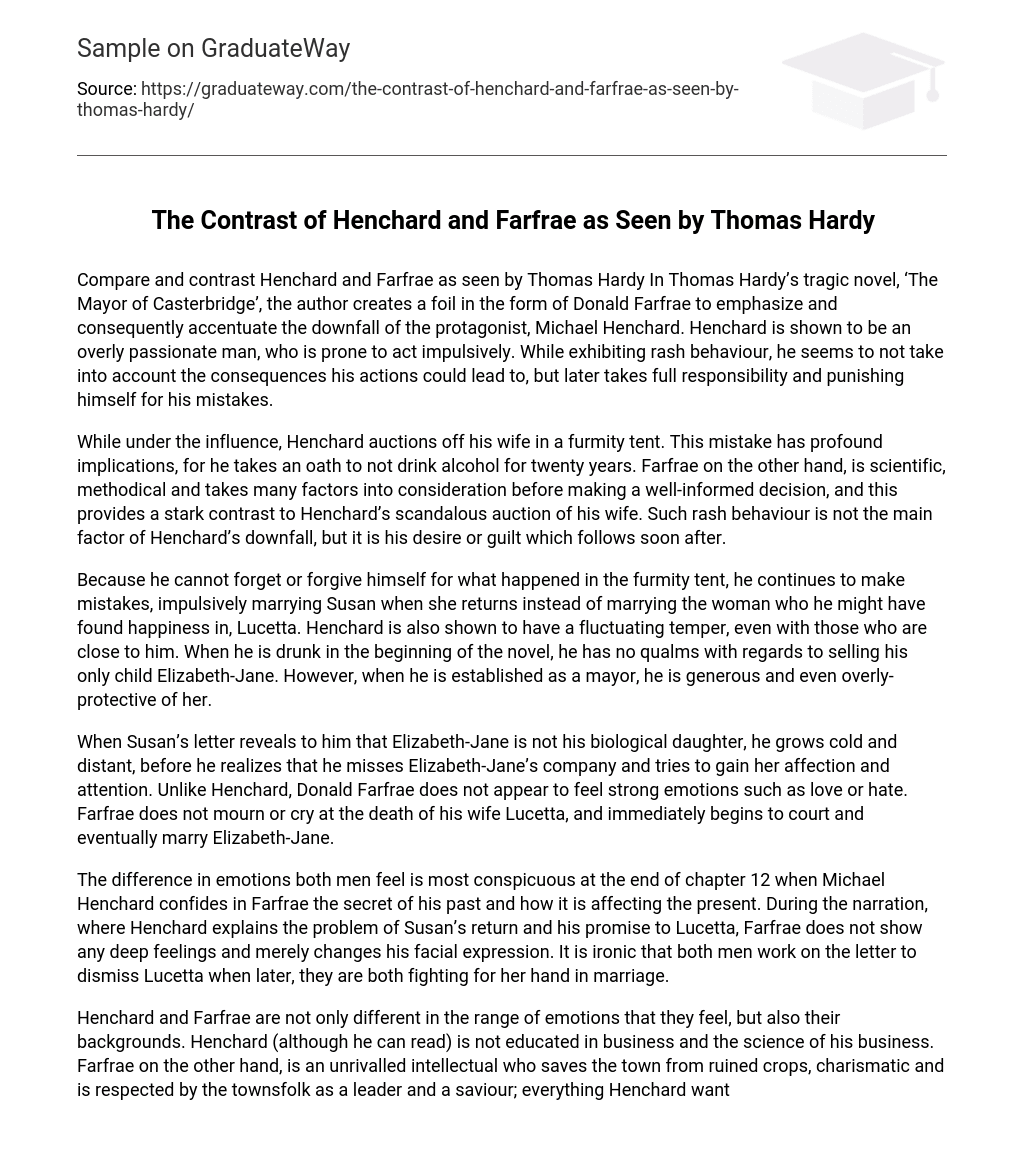Compare and contrast Henchard and Farfrae as seen by Thomas Hardy In Thomas Hardy’s tragic novel, ‘The Mayor of Casterbridge’, the author creates a foil in the form of Donald Farfrae to emphasize and consequently accentuate the downfall of the protagonist, Michael Henchard. Henchard is shown to be an overly passionate man, who is prone to act impulsively. While exhibiting rash behaviour, he seems to not take into account the consequences his actions could lead to, but later takes full responsibility and punishing himself for his mistakes.
While under the influence, Henchard auctions off his wife in a furmity tent. This mistake has profound implications, for he takes an oath to not drink alcohol for twenty years. Farfrae on the other hand, is scientific, methodical and takes many factors into consideration before making a well-informed decision, and this provides a stark contrast to Henchard’s scandalous auction of his wife. Such rash behaviour is not the main factor of Henchard’s downfall, but it is his desire or guilt which follows soon after.
Because he cannot forget or forgive himself for what happened in the furmity tent, he continues to make mistakes, impulsively marrying Susan when she returns instead of marrying the woman who he might have found happiness in, Lucetta. Henchard is also shown to have a fluctuating temper, even with those who are close to him. When he is drunk in the beginning of the novel, he has no qualms with regards to selling his only child Elizabeth-Jane. However, when he is established as a mayor, he is generous and even overly-protective of her.
When Susan’s letter reveals to him that Elizabeth-Jane is not his biological daughter, he grows cold and distant, before he realizes that he misses Elizabeth-Jane’s company and tries to gain her affection and attention. Unlike Henchard, Donald Farfrae does not appear to feel strong emotions such as love or hate. Farfrae does not mourn or cry at the death of his wife Lucetta, and immediately begins to court and eventually marry Elizabeth-Jane.
The difference in emotions both men feel is most conspicuous at the end of chapter 12 when Michael Henchard confides in Farfrae the secret of his past and how it is affecting the present. During the narration, where Henchard explains the problem of Susan’s return and his promise to Lucetta, Farfrae does not show any deep feelings and merely changes his facial expression. It is ironic that both men work on the letter to dismiss Lucetta when later, they are both fighting for her hand in marriage.
Henchard and Farfrae are not only different in the range of emotions that they feel, but also their backgrounds. Henchard (although he can read) is not educated in business and the science of his business. Farfrae on the other hand, is an unrivalled intellectual who saves the town from ruined crops, charismatic and is respected by the townsfolk as a leader and a saviour; everything Henchard wants to be. Henchard’s poor crops, and therefore his reputation and business, is saved by a last minute decision to hire Farfrae.
With the help of Farfrae’s unequalled knowledge in agricultural science and the nature of this business, Henchard grows more and more resentful when Farfrae consistently outperforms Henchard in every aspect of his life. Eventually, Farfrae is fired and a rivalry is established. Although Farfrae’s many commendable qualities illustrates Henchard’s ‘relentless and self-accusing soul’, it is Henchard’s endurance which allows him to bear any pain or hardship, self-inflicted or otherwise, which elevates him to a status of a hero.





